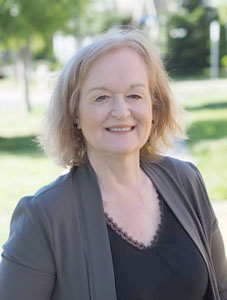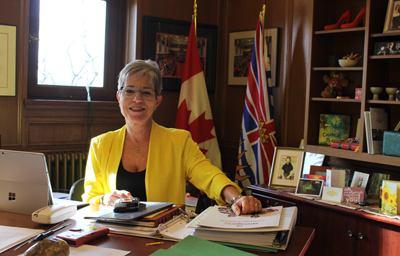
Friday October 20, 2023 | VICTORIA, BC [Updated November 18, 2023]
by Mary P Brooke, Editor | Island Social Trends
This week in the legislature, one of BC’s feistiest cabinet ministers rose in the house to announce that she is cancer-free.
Post-Secondary Education and Future Skills Minister Selina Robinson announced that a tumour — which had returned after many years of absence had come back (which people knew) — was now defeated. “I just heard from my oncologist that my tumour has disappeared. It’s great when your oncologist calls you, says your name and says: “I can’t see the tumour. It has been disappeared.”
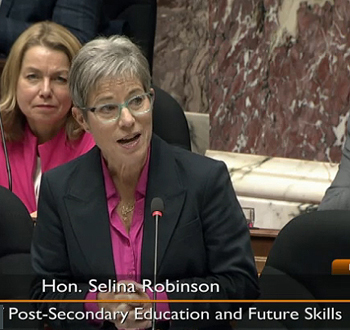
That was good news. There was heartfelt applause across the house, MLAs rising to their feet.
Robinson as finance minister (for a while under the Horgan government) led BC’s economic journey through the pandemic. When Horgan left and Eby took the reins in the premier’s office, Robinson was shifted to a renamed ministry called Post-Secondary Education and Future Skills. Upon that cabinet shuffle news in December 2022 the mainstream media tossed about the idea that this was a demotion. Who goes from managing all the money, to tinkering with post-secondary education?
But that was a miscue to the public. Robinson is true grit and brings a thoughtfulness that is well-applied in times that require a paradigm shift. Not only has she proven that with her fight against cancer, but she has gracefully demonstrated how to shift gears when in leadership near the top. It’s outmoded to think that it’s a failure or sign of weakness for having risen to what is considered a top portfolio only to be shifted to something less corporate.
Post-secondary impacts across the board:
But there is nothing unimportant about post-secondary education and training at any time, let alone when a province is growing, an economy is struggling, and the younger generation is seeking new pathways.
What could be called visionary on Eby’s part, Robinson is now guiding what is arguably one of the most significant portfolios for this decade.
Where will working adults be needed across the economy? How will young adults be motivated to devote themselves to careers in a never-ending sea change of opportunities? Who will figure out the integration between government, post-secondary institutions, businesses and community? And underlying all of that is the structure and resilience of the post-secondary institutions themselves. Robinson seems a fine pick for leading that enormous package which is undergoing a relentless pace of change.
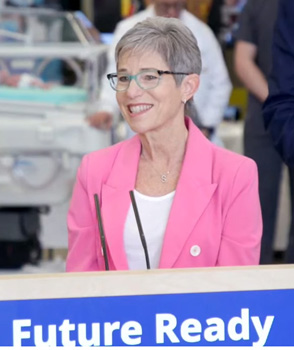
She released the Future Ready Action Plan in May 2023. Included in that is a new future skills grant to give thousands of people new skills and opportunities through grants for short-term training options from which they emerge with micro-credentials; 3,000 more tech-relevant post-secondary spaces; expanded skills training for people facing multiple barriers; and expanded post-secondary training and labour market opportunities to boost the participation and employment security of Indigenous Peoples across the economy.
Tough days led to this week’s announcement:
In an interview with Island Social Trends earlier this year, Robinson admitted that she was carrying on each day during the struggle with her cancer without flinching. Always a smile, seemingly never without full energy, Robinson carried forward in 2023 with her new portfolio with enthusiasm for what could be achieved.
“I fake it,” she said about never letting the cancer struggle show, saying the end of the day can be hard. But now she has a clean bill of health.
Signature imprint in post-secondary:
What’s her signature and thumbprint on Post-Secondary Education and Future Skills? Robinson says it’s how she can “work across ministries and see the linkages between all the various component parts of the plan, and how it plays out across ministry”. She adds: “That comes from my time as finance minister… when you see all of government, so being able to bring that lens, which is what the premier said — when he asked me to take this file — that is the piece that I bring, my familiarity with all of government and how we can pull all the various component parts of government together. To have a workforce that’s absolutely ready for the future.”
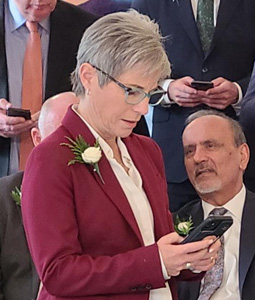
Robinson was first elected in the lower mainland riding of Coquitlam-Maillardville in 2013, re-elected in 2017 and 2020. Previous to holding the finance portfolio, she had headed up the ministry of Municipal Affairs and Housing, as before that Citizens’ Services. When responsible for housing, she had suggested that the federal government drop the PST on purpose-built rental construction; that was finally brought to fruition recently. When finance minister, she also held day-long think-tank sessions with bankers and economists, gleaning and absorbing their insights for reapplication into the BC economy.
What’s new in grappling with post-secondary and future training that wasn’t on the radar until the last few years? “There have been lots of surprises!,” said Robinson, jumping first to the impacts of COVID and how to deliver education differently. “We’ve heard from businesses. We did things like the digital boot camp which was oversubscribed and so popular,” the minister said, saying that new online methods have been incorporated into delivery models.
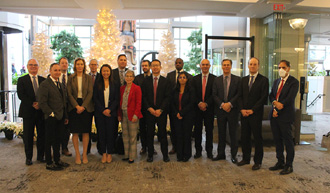
“We’re seeing tech continuing to explode,” for which 2,900 training seats had already been created since 2017, and more are evidently needed, she said. “We’re seeing more in early learning — the demand for child care providers, that is huge,” said Robinson. The Future Ready Action Plan includes that and other things learned over the last few years.
Righting the ship:
This week her restoration to full good health is celebrated. And as the next year unfolds her various impacts in education and training will begin to show. Much of the restructuring of post-secondary and training is to fold out over 10 years. Institutions, systems, and societal impacts are complex and naturally will evolve without many sudden shifts.
Like the slow but steady determination that Robinson has applied to her own health situation, so does she seem to take that approach to righting the ship for the broader health of the economy through education. Since becoming the Post-Secondary and Future Skills minister in December, Robinson has visited many of the universities and colleges around BC, making her way through the list.
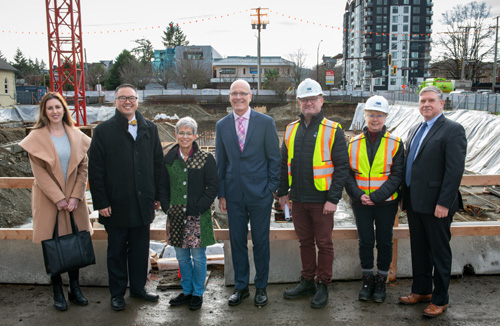
Also through higher education is the continual strengthening of the overall citizenry with the skills of critical thought and community participation, in addition to whatever academic field of study is undertaken. Robinson seems by temperament and intellect well-suited to enriching BC society with her methodical steps through the various areas she can influence.
Through her ministry there is also significant impact on research and innovation, as is done through post-secondary institutions.
On top of it all, this week Robinson was also commended by Premier Eby for her community leadership around antisemitism in BC which has reared its ugly head in response to the Middle East conflict — yet only 13 days old.
Broad societal impact:
Tiny but tough, this woman clearly makes a big impact in the societal life of this province.
In BC you can feel and see how people have a different way of doing things. It’s one of the reasons BC’s population has increased so dramatically in the past two years (nearly a quarter of a million people have in-migrated to BC)… we embrace a more holistic way of living here and put people first.
But youth and young adults need to feel welcome and capable of surviving in the tough economy that BC presents. Robinson’s thumbprint will also be on the degree of success that comes in helping the Gen-Z and next wave of youth find ways to meaningfully participate in the economy.
Maybe it’s from being so close to nature and the sea, or perhaps being so geographically far-flung as we are from the ‘center’ of Canadian commerce and politics that British Columbians — that people and government strike out in new and different ways. Perhaps it’s the generally fresher air (less pollution than in industrial centers of this nation) that feeds a healthier mindset and lifestyle, or the lure of outdoor recreation that rips people away from desks and boardrooms into nature. Perhaps it’s the can-do spirit of the non-Indigenous settlers — now blended with the ways of knowing of Indigenous peoples — that sees BC cutting a different cloth toward a unique and customized socioeconomic future.
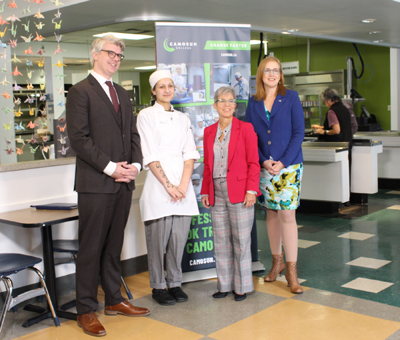
The affordability initiatives in BC are appealing to low-income Canadians and the economic opportunities are appealing to both industry investors and small business alike. The real estate sector has been appealing to those who can afford it. Skilled international immigrants are drawn here for a mix of all these reasons.
Whatever the reason, BC takes leadership in Canada (lately in housing legislation). Having fresh-minded thinkers like Robinson at the top of his cabinet (in addition to many others like Ravi Kahlon leading significant change in housing, and Niki Sharma generating fresh legal-sector directions), Eby is in good form for his next most obvious task at hand — to get re-elected in October 2024.
===== RELATED ARTICLES by ISLAND SOCIAL TRENDS:
- No place for hate in BC says Premier (October 16, 2023)
- Dropping GST on rental construction will help ease housing crisis (September 15, 2023)
- Capilano University to launch fifth campus in Squamish (August 16, 2023)
- Older workers included in Future Ready training initiatives (May 3, 2023)
- Future Ready skills-to-economy matching amidst quarter-million population influx (May 2, 2023)
- Labour Market Outlook rolled out with pitch to young & returning workers (February 8, 2023)
- Selina Robinson heads into post-secondary portfolio (December 7, 2022)
- Economists see housing and risk-vs-uncertainty as key challenges in 2023 (December 6, 2023)
- Day after Budget 2022: Victoria Chamber hosts Finance Minister Robinson (February 23, 2022)
- BC announces inflation-response support (September 7, 2022)
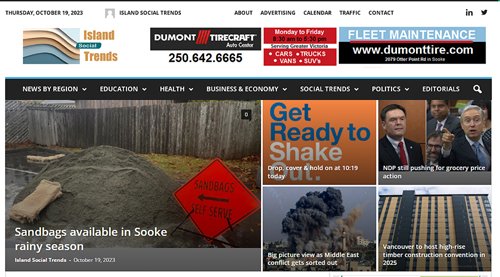
===== ABOUT THE WRITER:
Mary P Brooke, B.Sc., Cert PR is the founder and editor of Island Social Trends (2020 to present), a news publication with a socioeconomic lens on trends in politics, economy, health, education, governance and communities.
Island Social Trends is the fourth publication in a series that started with MapleLine Magazine (2008-2010), which expanded into the weekly print newspaper Sooke Voice News (2011-2013), which then further expanded its regional and contextual reach with the weekly print/PDF publication West Shore Voice News (2014-2020).
Mary Brooke was nominated in 2023 for a Jack Webster Foundation award which recognizes a woman journalist’s contribution to her community through journalism. Mary covered local news in Sooke, Langford and the broader west shore in detail during 2011 to 2020. She reported daily on the COVID pandemic during 2020-2022. She now reports on key moments with the BC Legislative Press Gallery while still operating her own publishing company Brookeline Publishing House Inc in the west shore region of Greater Victoria.
Mary P Brooke ran for school trustee in 2022. She is the proud mother of four wonderful grown children who contribute in many sectors of society and economy including health-care quality assurance, fin-tech, animal welfare and the creative arts.






